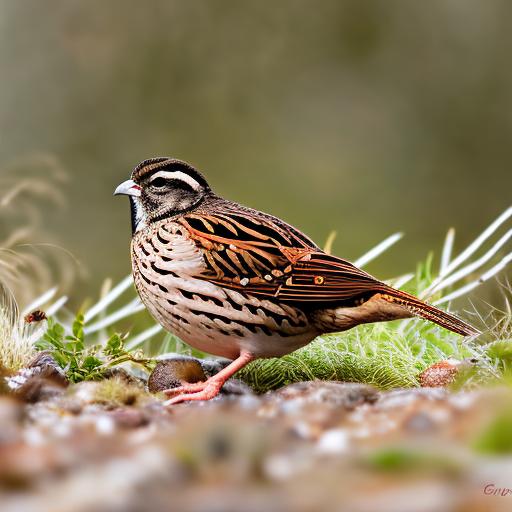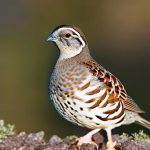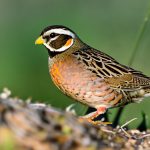When it comes to choosing the right quail species for your home, there are several factors to consider. First and foremost, you’ll want to think about the purpose of keeping quail. If you’re interested in raising quail for their eggs, then you might want to consider species such as the Coturnix quail, also known as Japanese quail, which are known for their prolific egg-laying capabilities. On the other hand, if you’re looking to keep quail for meat production, then species like the Bobwhite quail might be a better fit due to their larger size and meatier bodies.
Another important consideration when choosing a quail species is the climate in your area. Some species of quail are better suited to colder climates, while others thrive in warmer environments. For example, the Northern Bobwhite is well adapted to colder climates, while the Gambel’s quail is better suited to warmer, arid regions. It’s important to choose a species that is well-suited to the climate in which you live to ensure the health and well-being of your quail.
In addition to considering the purpose and climate, it’s also important to think about the space you have available for keeping quail. Some species of quail require more space than others, so it’s important to choose a species that can comfortably fit within the confines of your available space. For example, the Coturnix quail is known for its ability to thrive in smaller enclosures, making it a popular choice for backyard quail enthusiasts with limited space. Ultimately, the right quail species for your home will depend on your specific needs, climate, and available space.
Key Takeaways
- Choose the quail species that best suits your home environment and needs
- Set up an enclosure that provides enough space and protection for quail
- Provide a balanced diet with proper nutrition for the health of your quail
- Understand quail behavior and social dynamics to ensure a harmonious environment
- Maintain the health and hygiene of your quail through regular cleaning and monitoring
Setting Up a Suitable Enclosure for Quail
Once you’ve chosen the right quail species for your home, it’s important to set up a suitable enclosure to ensure the health and well-being of your quail. The size of the enclosure will depend on the number of quail you plan to keep, as well as the specific needs of the species you’ve chosen. In general, it’s recommended to provide at least 1 square foot of space per quail to ensure they have enough room to move around comfortably.
When it comes to the type of enclosure, there are several options to consider. For smaller numbers of quail, a simple wire or mesh cage may be sufficient, while larger flocks may require a dedicated quail hutch or coop. It’s important to provide adequate ventilation and protection from predators, as well as a secure area for roosting and nesting. Additionally, it’s important to provide a suitable substrate for your quail, such as straw or wood shavings, to ensure a clean and comfortable living environment.
In addition to the physical enclosure, it’s also important to consider the outdoor space available for your quail. If possible, providing access to an outdoor run or pen can help to provide your quail with additional space to roam and forage, as well as exposure to natural sunlight and fresh air. Ultimately, setting up a suitable enclosure for your quail is essential for their health and well-being, so it’s important to carefully consider their specific needs and provide a comfortable and secure living environment.
Providing the Proper Diet and Nutrition for Quail
Providing the proper diet and nutrition is essential for the health and well-being of your quail. A balanced diet is crucial for ensuring that your quail receive all the necessary nutrients they need to thrive. In general, a good quality commercial game bird feed can serve as the foundation of your quail’s diet, providing essential nutrients such as protein, vitamins, and minerals. It’s important to choose a feed specifically formulated for quail to ensure that their specific nutritional needs are met.
In addition to commercial feed, it’s also important to provide your quail with access to fresh water at all times. Quail are known for their high water intake, especially during hot weather or when laying eggs, so it’s important to regularly check and refill their water supply to prevent dehydration. Additionally, providing access to grit or small stones can help your quail with digestion by aiding in the breakdown of food in their gizzards.
In addition to commercial feed and water, it’s also beneficial to supplement your quail’s diet with fresh greens and protein sources such as mealworms or crickets. Fresh greens can provide additional vitamins and minerals, while protein sources can help support egg production and overall health. It’s important to monitor your quail’s diet and adjust their feed as needed based on their specific needs and life stage. By providing a balanced diet and proper nutrition, you can help ensure that your quail remain healthy and productive.
Understanding Quail Behavior and Social Dynamics
Understanding quail behavior and social dynamics is essential for successfully keeping and raising these birds at home. Quail are social animals that thrive in groups, so it’s important to provide them with appropriate social interactions and living conditions. In general, quail are known for their gentle and non-aggressive nature, making them well-suited for group living. However, it’s important to monitor their behavior and interactions to ensure that they are getting along well and not exhibiting any signs of aggression or stress.
Quail are also known for their strong flocking instinct, which means they prefer to stay close together and can become stressed if separated from their group. Providing ample space and suitable living conditions can help prevent stress and aggression among your quail flock. Additionally, providing hiding spots and areas for privacy can help reduce stress and promote natural behaviors.
It’s also important to understand the specific behaviors of the species of quail you are keeping. For example, Coturnix quail are known for their active nature and tendency to explore their surroundings, while Bobwhite quail are more likely to seek cover and stay hidden. Understanding these behaviors can help you provide suitable living conditions and enrichment for your quail.
Overall, understanding quail behavior and social dynamics is essential for creating a harmonious living environment for your birds. By providing suitable living conditions and monitoring their behavior, you can help ensure that your quail remain healthy and content in their home.
Maintaining the Health and Hygiene of Quail
Maintaining the health and hygiene of your quail is essential for preventing disease and ensuring their overall well-being. Regular cleaning and maintenance of their enclosure is crucial for preventing the buildup of waste and bacteria that can lead to illness. It’s important to regularly remove soiled bedding, droppings, and uneaten food from their enclosure to keep it clean and hygienic.
In addition to regular cleaning, it’s also important to monitor your quail for any signs of illness or injury. Common signs of illness in quail include lethargy, decreased appetite, abnormal droppings, or respiratory symptoms. If you notice any of these signs, it’s important to seek veterinary care promptly to prevent the spread of disease within your flock.
Providing a clean and hygienic living environment is essential for preventing disease and promoting the overall health of your quail. Additionally, practicing good biosecurity measures can help prevent the introduction of disease into your flock. This includes quarantining new birds before introducing them to your existing flock, as well as preventing contact with wild birds or other potential sources of disease.
Overall, maintaining the health and hygiene of your quail is essential for preventing disease and ensuring their overall well-being. By practicing good hygiene and monitoring their health closely, you can help ensure that your quail remain healthy and thriving in their home.
Handling and Interacting with Quail

Handling and interacting with quail requires gentle care and patience to ensure their comfort and well-being. Quail are generally skittish birds that can become stressed when handled or approached suddenly. It’s important to approach them calmly and slowly to avoid causing unnecessary stress.
When handling quail, it’s important to support their body properly by gently cupping them in your hands or securing them against your body. Avoid grabbing them by their wings or legs, as this can cause injury or stress. Additionally, it’s important to handle them gently and avoid sudden movements or loud noises that can startle them.
In addition to handling, interacting with your quail can help build trust and socialize them to human presence. Spending time near their enclosure and speaking softly to them can help acclimate them to your presence over time. Additionally, providing treats such as mealworms or fresh greens can help create positive associations with human interaction.
Overall, handling and interacting with quail requires patience and gentle care to ensure their comfort and well-being. By approaching them calmly and handling them gently, you can help build trust and create positive interactions with your birds.
Breeding and Raising Quail Chicks at Home
Breeding and raising quail chicks at home can be a rewarding experience for backyard enthusiasts. When breeding quail, it’s important to provide suitable nesting areas for your hens to lay their eggs. This can be achieved by providing nesting boxes filled with suitable nesting material such as straw or wood shavings.
Once the eggs are laid, they should be collected daily to prevent them from being damaged or eaten by other birds. The eggs can then be placed in an incubator set at the appropriate temperature and humidity levels for successful hatching. It’s important to monitor the development of the eggs closely and make any necessary adjustments to ensure a successful hatch.
Once the chicks hatch, they should be provided with a warm brooder area equipped with heat lamps or heating pads to maintain their body temperature. Additionally, providing access to chick starter feed formulated specifically for young quail is essential for their growth and development.
Raising quail chicks requires careful monitoring of their health and well-being during their early stages of life. Providing a clean living environment, access to fresh water, and suitable nutrition is essential for ensuring their growth and development. By providing proper care and attention, you can successfully breed and raise healthy quail chicks at home.
Raising quail chicks also involves keeping them warm and protected from predators. It is important to provide a heat source, such as a heat lamp, to maintain the chicks’ body temperature. Additionally, ensuring that the chicks have access to a safe and secure enclosure will help protect them from potential harm. Regular observation and handling of the chicks will also allow you to identify any potential health issues early on and provide necessary care. With dedication and proper management, raising quail chicks can be a rewarding experience for any poultry enthusiast.
If you’re considering keeping quail at home, you may also be interested in creating a suitable living space for them. Poultry Wizard offers a helpful article on large chicken coop ideas that can be easily adapted for quail housing. Check out their article on large chicken coop ideas here for inspiration on how to provide a comfortable and secure environment for your quail.
FAQs
What are the benefits of keeping quail at home?
Quail are relatively low maintenance and can provide a sustainable source of eggs and meat for the household. They also have a small footprint, making them suitable for urban or suburban settings.
What do quail need in terms of housing and space?
Quail require a secure and predator-proof housing structure, such as a coop or aviary, with adequate ventilation and protection from the elements. They also need access to a suitable outdoor space for foraging and dust bathing.
What do quail eat and drink?
Quail are omnivorous and require a balanced diet of commercial quail feed, supplemented with fresh greens, insects, and grit. They also need access to clean water at all times.
How do you care for quail in terms of health and hygiene?
Quail require regular cleaning of their housing and nesting areas to prevent the buildup of waste and bacteria. They also need access to dust baths to help maintain their plumage and control parasites.
Are there any legal considerations for keeping quail at home?
It’s important to check local regulations and zoning laws before keeping quail at home, as some areas may have restrictions on the number of birds allowed or specific requirements for their housing and care.
What are some common predators of quail and how can they be protected?
Common predators of quail include raccoons, foxes, and birds of prey. Quail can be protected by ensuring their housing is secure and predator-proof, and by providing adequate cover and hiding spots in their outdoor space.
Meet Walter, the feathered-friend fanatic of Florida! Nestled in the sunshine state, Walter struts through life with his feathered companions, clucking his way to happiness. With a coop that’s fancier than a five-star hotel, he’s the Don Juan of the chicken world. When he’s not teaching his hens to do the cha-cha, you’ll find him in a heated debate with his prized rooster, Sir Clucks-a-Lot. Walter’s poultry passion is no yolk; he’s the sunny-side-up guy you never knew you needed in your flock of friends!







